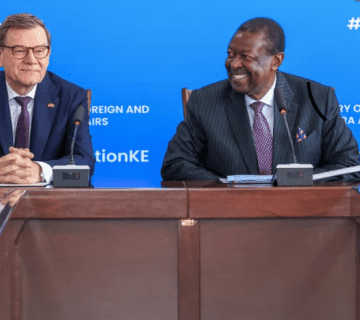President Uhuru Kenyatta’s announcement, waiving the requirement for Africans visiting Kenya to obtain visas before arriving in the country, continues to divide opinion among Kenyans. In November 2017, the President declared, “Today, I am directing that any African wishing to visit Kenya will be eligible to receive a visa at the port of entry…this shall not be done on the basis of reciprocity.” This was during his inauguration as President, for his second and final term. While some think that such a move would transform Kenya into a home for all types of social misfits, and a place where all social ills thrive, others think tourist numbers would increase, growing the economy.
The President also stated that the move would integrate and unite Africa more, decrease divisive politics, and increase appreciation of the continent’s rich diversity. He said obtaining a visa on arrival at any legal crossing point would revive pan-Africanism, and foster mutual security. The Kenya Citizenship and Immigration Act (KCI Act) No. 12 of 2011, addresses issues related to Kenyan citizenship, work permits, travel documents, and matters concerning entering and exiting the territory. The Act also stipulates penalties for non-compliance. Kenya would have to fast track changes relating to immigration, and amend existing immigration laws before the President’s statement can become a policy, and/or Kenya can accommodate more foreigners. The question that both critics and supporters want answered is how opening the borders to all Africans could affect the Kenyan economy.
According to Trading Economics (2017), Kenya’s Gross Domestic Product (GDP) was KSh. 705 billion in 2016. A Kenya National Bureau of Statistics (KNBS) survey of 11 July 2017 indicates Kenya’s volume of trade dropped from KSh. 218.50 billion in July 2017 to KSh. 185.96 billion in August 2017. The value of total exports decreased to KSh. 41.7 billion, while the value of imports dropped from KSh. 165.6 billion in July to KSh. 144.3 billion in August 2017. The total number of visitors who arrived at Jomo Kenyatta International Airport (JKIA) and Moi International Airport (MIA) decreased from 105,241 in July 2017 to 89,782 in August 2017. Agriculture, tourism, and trade, are some of the sectors of the economy which could be affected if the President’s declaration is considered. Kenya’s economy is expected to grow at the rate of 5.6 per cent per year, in 2018, and reach 6.8 per cent growth by 2020.
Kenya’s main economic activity is agriculture. The country is renowned for the export of quality products, including tea, coffee, cut flowers, meat products, leather goods, and vegetables. Agriculture contributes approximately 45 per cent to the government revenue annually. It also contributes more than 50 per cent of the export earnings, and over 75 per cent of industrial raw material. Agriculture also contributes 24 per cent of the GDP directly, and 27 per cent of the GDP indirectly, through linkages with manufacturing, distribution, and other service-related sectors. In rural areas, over 80 per cent of the population practice agriculture as their main source of livelihood. Nationally, the sector accounts for 60 per cent of the total employment, making it the country’s biggest employer, and the bedrock of Kenya’s economy. Increased demand for agricultural products could lead to increased investment in agriculture, which could improve the economy.
Another key sector that could be affected if the President’s statement is considered is tourism. According to KNBS (2017), the number of tourist arriving at the country’s main airports, JKIA and MIA, decreased from 89,782 in August 2017 to 87,440 in September 2017. This figure is consistent with research done by Trading Economics (2017) which shows that tourist arrivals in Kenya decreased from 105,241 in July to 89,782 in August 2017. However, the decrease could be attributed to the violence before and after the 2017 general election in Kenya. According to the Economic Impact of Travel and Tourism (2017), tourism supported 399,000 jobs in the year 2016. The total contribution of travel and tourism to GDP was KSh. 670 billion in the same period. It is not clear how the non-visa declaration could affect tourist numbers, but the potential to increase numbers remains. Some tourists may want to visit regions such as Kericho, and Naivasha, where tea, and flowers, respectively, are grown large scale.
A report by Turner and Townsend, titled ‘International Construction Market Survey’ (2017), indicates that Nairobi is one of the cheapest cities in which to construct buildings. The duo also cites real estate and construction as two sectors currently driving economic growth in Kenya. According to the KNBS (2017), cement production rose from 451,651 metric tonnes in August 2017 to 477,571 metric tonnes in September 2017. The high production was because of increased demand for cement meant for construction. This led to the consumption of cement going up to 453,198 metric tonnes from 427, 594 in the same period. Indeje (2017) has reviewed the country’s construction sector. Based on the increasing number of infrastructure projects, Indeje projects steady growth in the sector over the next decade. The demand for housing could increase if the President’s declaration is implemented, accelerating the rate of construction, increasing investment in the sector, and providing employment.
The Danger of Cross-Border Crime
Skeptics fear that the relaxation of immigration rules might attract more foreign drug cartels to the country. The cartels, in collaboration with some Kenyan citizens, could sell narcotics drugs in the country. A 2012 International Narcotics Control Board report indicates that Kenya is a producer for cannabis sativa, and it is a pathway for drug trafficking. In October 2017, officers from the Kenya Anti-Narcotic Department busted two cabin crew members of Kenya’s national carrier. The two had 21 kilograms of narcotics worth KSh. 150 million. In July 2014, the Kenyan navy seized a ship linked to drugs and other illegal trade within the Indian Ocean (off Mombasa). In connection to that, five suspects, among them four Kenyans, were arrested. Their vessel contained heroine worth KSh. 1.5 billion. The vessel was later blown up in the high seas as a sign of the Kenyan government commitment in the fight against the drug trade.
Drug traffickers tend to launder money (placing proceeds from drug sales in the financial system) to legitimize their trade. They may transfer the money to other countries, for instance. The United Nations’ Office on Drugs and Crimes’ 2016 world drug report shows the total number of cocaine seizures in Africa increased to 78 per cent between 2009 and 2014. Most of the drugs were from western Africa (Cape Verde, Gambia, Nigeria, Ghana). Elece per cent of the seizures originated in North Africa. The drug money is then gambled, or transferred to banks abroad (to avoid detection), and used for real estate development, and/or to finance political parties, and political campaigns. Such cases may increase if the President’s declaration is taken seriously.
Cautious Adoption
Only a handful of African countries have implemented a non-visa policy such as the one President Uhuru’s declaration has called for. The impacts of this policy on Rwanda and Seychelles were both positive and negative. An African Development Bank Group report, titled ‘Visa restrictions and economic consequences in Africa’ (2013) indicates international tourism in Seychelles increased by an estimated seven per cent annually between 2009 and 2014 after a non-visa policy was adoption. Drug trafficking increased too in that period. In April 2016, for example, Seychelles Coast Guard and the National Drugs Enforcement Agency (NDEA) arrested eight Iranians suspected of trafficking heroine and opium. They were on a board dhow.
Following the Rwanda’s adoption of a similar policy in 2013, tourism arrivals from other African countries increased by 24 per cent. Trade with neighboring countries also increased by 50 per cent. For instance, bilateral trade between Rwanda and the Democratic Republic of Congo rose by 73 per cent.
Mauritius, which neighbors Seychelles, insisted that visitors apply and obtain visas before travelling to the country. Tourism stagnated, compelling the Mauritian government to relax visa regimes for 30 African countries, and 75 countries overall.
Corruption is one of the challenges Kenya would have to overcome before giving life to such a directive. According to trading economics Kenya corruption index (2017), Kenya scored 26 points out of the 100 on the 2016 corruption perceptions Index. Transparency International (2017), ranks Kenya at number 145 out of 176 countries surveyed, with a score of 26. Corruption would let social ills thrive, and undermine the economy.
Kenya would also need to implement trade protectionism measures to cushion Kenyan industries from unfair competition. One such measure would be to increase tariffs on imported goods. Another would be to subsidize local industries. Additionally, only legitimate and law-abiding business would be allowed to manufacture, import, and/or exports of products. Locally produced products must use anti-counterfeit features on their products. This would make it easier for consumers and government officials to authenticate local products. Kenya could also collaborate with regional and international partners to counter trade in contra band goods, including illegal drugs and wild animal products. Advanced scanners could be used to locate illegal goods.
Ian Mwenda is a Research Assistant at the HORN Institute.



